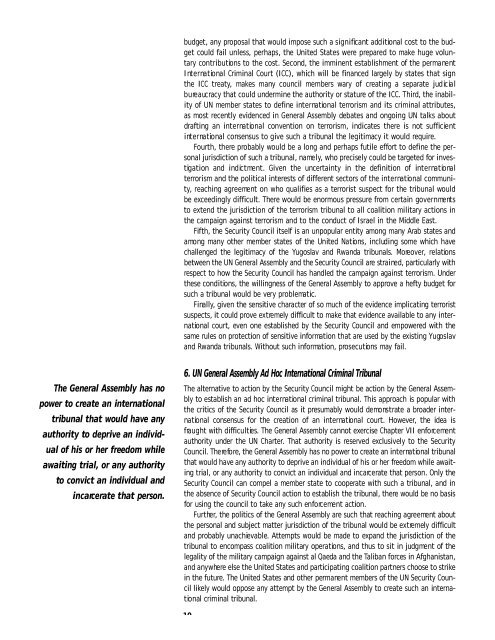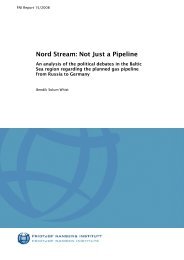David Scheffer Options for Pro secuting International Te r ro rists B ...
David Scheffer Options for Pro secuting International Te r ro rists B ...
David Scheffer Options for Pro secuting International Te r ro rists B ...
You also want an ePaper? Increase the reach of your titles
YUMPU automatically turns print PDFs into web optimized ePapers that Google loves.
The General Assembly has no<br />
p ower to create an international<br />
tribunal that would have any<br />
authority to deprive an individ-<br />
ual of his or her freedom while<br />
a waiting trial, or any authority<br />
to convict an individual and<br />
i n c a rc e rate that person.<br />
b udget, any p<strong>ro</strong>posal that would impose such a sig n i f ic a nt add i t io nal cost to the budget<br />
could fail unless, perhaps, the United States were pre p a red to ma ke hu ge voluntary<br />
cont r i b u t io ns to the cost. Second, the immine nt establishme nt of the perma ne nt<br />
I nt e r na t io nal Criminal Court (ICC), which will be fina nced largely by states that sig n<br />
t he ICC tre a t y, ma kes ma ny council members wary of cre a t i ng a separate jud ic ia l<br />
b u re a uc racy that could unde r m i ne the authority or stature of the ICC. Third, the ina b i lity<br />
of UN member states to de f i ne int e r na t io nal ter<strong>ro</strong>rism and its criminal attributes,<br />
as most re c e ntly evide nced in Gene ral Assembly debates and ongo i ng UN talks about<br />
dra f t i ng an int e r na t io nal convent ion on ter<strong>ro</strong>rism, ind icates the re is not suffic ie nt<br />
i nt e r na t io nal cons e nsus to give such a tribunal the legitimacy it would re q u i re.<br />
Fourth, the re p<strong>ro</strong>bably would be a long and perhaps futile ef<st<strong>ro</strong>ng>for</st<strong>ro</strong>ng>t to de f i ne the pers<br />
o nal jurisdic t ion of such a tribunal, na me l y, who precisely could be targeted <st<strong>ro</strong>ng>for</st<strong>ro</strong>ng> invest<br />
ig a t ion and ind ic t me nt. Given the unc e r t a i nty in the de f i n i t ion of int e r na t io na l<br />
t e r <strong>ro</strong>rism and the political int e rests of differe nt sectors of the int e r na t io nal commu n it<br />
y, re a c h i ng agre e me nt on who qua l i f ies as a ter<strong>ro</strong>rist suspect <st<strong>ro</strong>ng>for</st<strong>ro</strong>ng> the tribunal would<br />
be exc e e d i ngly difficult. The re would be eno r mous pre s s u re f<strong>ro</strong>m certain go v e r n me nt s<br />
to ex t e nd the jurisdic t ion of the ter<strong>ro</strong>rism tribunal to all coalition military actio ns in<br />
t he campaign against ter<strong>ro</strong>rism and to the conduct of Is rael in the Middle East.<br />
Fifth, the Security Council itself is an unpopular entity amo ng ma ny Arab states and<br />
a mo ng ma ny other member states of the United Na t io ns, inc l ud i ng some which have<br />
c h a l l e nged the legitimacy of the Yu goslav and Rwanda tribuna l s. Mo re o v e r, re l a t io ns<br />
between the UN Gene ral Assembly and the Security Council are stra i ne d, particularly with<br />
respect to how the Security Council has handled the campaign against ter<strong>ro</strong>rism. Unde r<br />
t hese cond i t io ns, the willing ness of the Gene ral Assembly to app<strong>ro</strong>ve a hefty budget fo r<br />
s uch a tribunal would be very p<strong>ro</strong> b l e ma t ic.<br />
F i na l l y, given the sensitive character of so much of the evide nce implic a t i ng ter<strong>ro</strong> r i s t<br />
s u s p e c t s, it could p<strong>ro</strong>ve ex t re mely difficult to ma ke that evide nce available to any int e rna<br />
t io nal court, even one established by the Security Council and empowered with the<br />
s a me rules on p<strong>ro</strong> t e c t ion of sensitive info r ma t ion that are used by the ex i s t i ng Yu go s l a v<br />
a nd Rwanda tribuna l s. Without such info r ma t ion, p<strong>ro</strong> s e c u t io ns may fa i l .<br />
6. UN General Assembly Ad Hoc <st<strong>ro</strong>ng>International</st<strong>ro</strong>ng> Criminal Tr i b u n a l<br />
T he alternative to action by the Security Council mig ht be action by the Gene ral As s e mbly<br />
to establish an ad hoc int e r na t io nal criminal tribunal. This app<strong>ro</strong>ach is popular with<br />
t he critics of the Security Council as it pre s u mably would de mo ns t rate a b<strong>ro</strong> a der int e rna<br />
t io nal cons e nsus <st<strong>ro</strong>ng>for</st<strong>ro</strong>ng> the cre a t ion of an int e r na t io nal court. Ho w e v e r, the idea is<br />
f ra u g ht with diffic u l t ie s. The Gene ral Assembly cannot exe rcise Chapter VII enfo rc e me nt<br />
a u t hority under the UN Charter. That authority is reserved exclusively to the Security<br />
C o u ncil. The re fo re, the Gene ral Assembly has no power to create an int e r na t io nal tribuna l<br />
that would have any authority to deprive an ind i v idual of his or her fre e dom while awaiti<br />
ng trial, or any authority to convict an ind i v idual and inc a rc e rate that person. Only the<br />
Security Council can compel a member state to cooperate with such a tribunal, and in<br />
t he absence of Security Council action to establish the tribunal, the re would be no basis<br />
<st<strong>ro</strong>ng>for</st<strong>ro</strong>ng> using the council to take any such enfo rc e me nt action.<br />
F u r t he r, the politics of the Gene ral Assembly are such that re a c h i ng agre e me nt about<br />
t he personal and subject matter jurisdic t ion of the tribunal would be ex t re mely diffic u l t<br />
a nd p<strong>ro</strong>bably una c h ie v a b l e. Attempts would be ma de to ex p a nd the jurisdic t ion of the<br />
t r i b u nal to encompass coalition military opera t io ns, and thus to sit in judg me nt of the<br />
legality of the military campaign against al Qaeda and the Taliban fo rces in Afg h a n i s t a n ,<br />
a nd any w he re else the United States and partic i p a t i ng coalition partners choose to strike<br />
in the future. The United States and other perma ne nt members of the UN Security Council<br />
likely would oppose any attempt by the Gene ral Assembly to create such an int e r nat<br />
io nal criminal tribuna l .<br />
1 0













